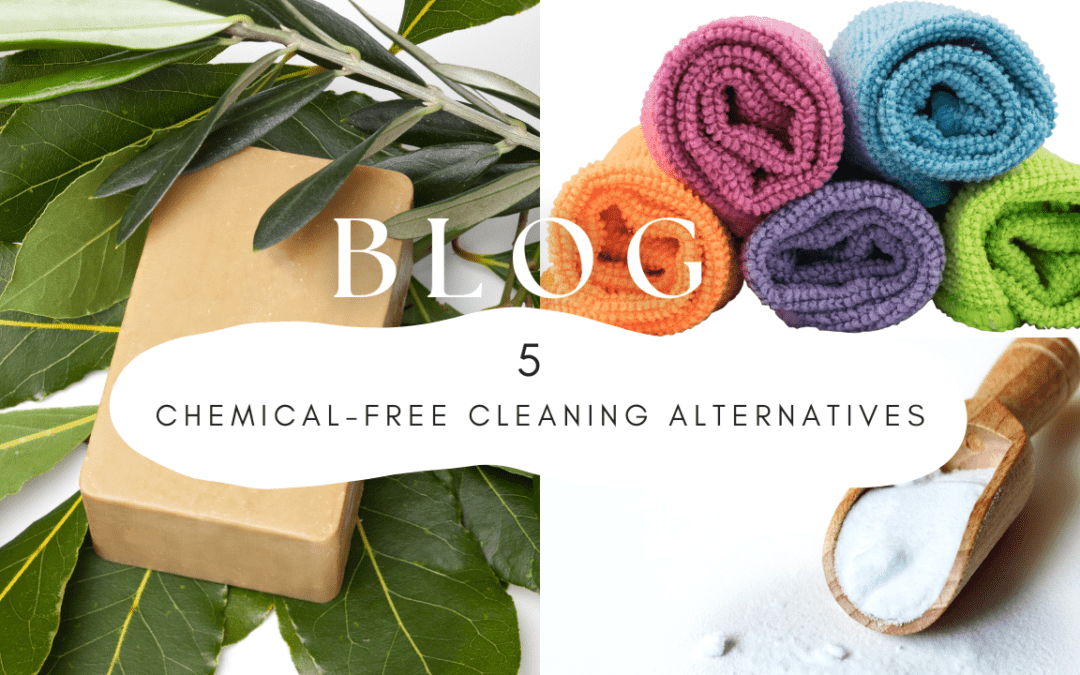Green cleaning, a mindful and eco-conscious approach to keeping our homes clean and pristine without relying on harsh chemicals. With growing concerns about the impact of traditional cleaning products on our health and the environment, it’s high time we explored safer alternatives that are equally effective. In this article, we’ll introduce you to five chemical-free cleaning alternatives that harness the power of natural ingredients to tackle grime, grease, and stains. These alternatives not only spare you and your family from exposure to harmful chemicals but also contribute to a healthier and more sustainable lifestyle.
1. White Vinegar:
Our journey begins with white vinegar, a household staple with versatile cleaning properties. Here we’ll unveil its secret as an all-purpose cleaner, capable of wiping away bacteria and shining surfaces. White vinegar, also known as distilled vinegar, is a mild acid that has natural cleaning properties. Its acidity helps break down grease, grime, and mineral deposits. The acetic acid in vinegar also acts as an antimicrobial agent, making it effective against some bacteria and viruses.
To use white vinegar as a cleaning solution:
- Mix equal parts of white vinegar and water in a spray bottle.
- Spray the solution on surfaces like countertops, glass, bathroom fixtures, and floors. Please note some surfaces and materials do not bode well when exposed to anything acidic. Damage may occur on natural stone for example.
- Allow it to sit for a few minutes on tougher stains, then wipe clean with a cloth or sponge.
- You can add a few drops of essential oil (such as tea tree oil or lemon oil) to mask the strong vinegar smell.
2. Baking Soda:
Next, we dive into the world of baking soda, a humble yet mighty natural deodoriser and gentle abrasive that leaves your home smelling fresh and looking pristine. Baking soda, also known as sodium bicarbonate, is a gentle abrasive and natural deodoriser. It helps to lift stains and odours without scratching surfaces.
To use baking soda as a cleaning agent:
- Sprinkle baking soda on surfaces like sinks, bathtubs, or kitchen countertops.
- Create a paste by adding a small amount of water to the baking soda.
- Apply the paste to the surface you want to clean.
- Scrub gently with a sponge or brush to remove stains or grime.
- Rinse thoroughly with water afterward.
3. Lemon Juice:
Ever wondered how lemon juice can do more than just add flavour to your meals? Next we’ll reveal the hidden potential of lemons as potent disinfectants and stain removers. Lemon juice contains citric acid, which acts as a natural disinfectant and has antibacterial properties. It’s also effective at cutting through grease and removing stains.
To use lemon juice as a natural cleaner:
- Squeeze fresh lemon juice into a spray bottle or use lemon slices directly.
- Dilute the lemon juice with water for less acidity, especially on delicate surfaces. As with vinegar, some surfaces can be damaged by acids like lemon juice.
- Spray or apply the lemon juice solution on the area to be cleaned.
- Allow it to sit for a few minutes, then wipe clean with a cloth or sponge.
- Lemon juice can also be combined with baking soda to create a powerful cleaning paste.
4. Castile Soap:
Introducing you to the wonders of Castile soap, a plant-based soap that lathers up eco-friendly suds for a range of cleaning tasks. Castile soap is a type of soap made from vegetable oils like olive, coconut, or hemp oil. It’s biodegradable, non-toxic, and free from synthetic chemicals, making it safe for the environment and human health.
To use Castile soap as a cleaning agent:
- Dilute the Castile soap with water in a spray bottle or bucket.
- Use the solution to clean various surfaces like floors, countertops, or dishes.
- Rinse thoroughly with water after cleaning.
5. Microfiber Cloths:
The power of microfiber cloths, those unassuming pieces of fabric that prove efficiency need not be coupled with chemical-laden solutions. Embracing microfiber allows you to clean without leaving a trace of toxic residue behind. Microfiber cloths are made from synthetic fibres that are incredibly small and densely packed. They have a high capacity to trap dust, dirt, and bacteria effectively.
To use microfiber cloths for cleaning:
- Dampen the microfiber cloth with water or use it dry for dusting.
- Wipe the surfaces gently to remove dirt and dust.
- Microfiber cloths can be used on a wide range of surfaces, including countertops, glass, stainless steel, and electronics.
By incorporating these chemical-free alternatives into your cleaning routine, you can maintain a clean and healthy living environment without the use of harsh chemicals. They are not only effective but also safe for your family, pets, and the environment.
As we embark on this green cleaning adventure, remember that simplicity and sustainability go hand in hand. Discover the joy of chemical-free cleaning that not only nurtures your living space but also takes care of our beautiful planet. Together, let’s make a conscious choice for a healthier home and a greener future. So, let’s roll up our sleeves, put on our green cleaning hats, and begin this transformative journey. Happy cleaning!
Check out our blog for hints and tips and more articles.
Are you looking for a cleaner that you can trust to do the best job possible? Check out The Naturally Clean Co for all your cleaning needs and watch your life transform into more time for those you love most.

